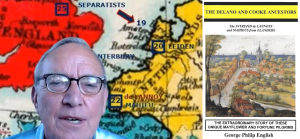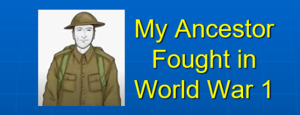Are you curious about where your surname came from? Does it seem unusual – maybe indicates that your ancestors came from England, Scotland, Wales, or Ireland? This blog explains how surnames originated and how Research Through People go about researching your ancestors and bringing them to life. Discover your British family heritage with professional genealogists and uncover a past that you never knew existed.
What can you learn from your English, Scottish, Welsh & Irish surname
We’ve made lots of videos. The ones that get the most views are the ones about surnames. Often that is the start point for people getting interested in family history.
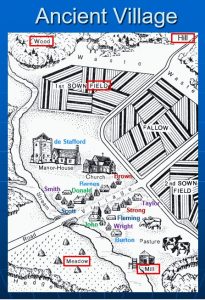
Imagine yourself back in the 12th or 13th century in a village when there were no surnames. What happened was that people got a surname from something that distinguished them. In this imaginary village, the Lord of the Manor took the surname de Stafford.
Someone who lived near the wood, could be called ‘wood’ – then came along and they get the name ‘Wood’ based on the place where they lived. People moved from another village, maybe called Barnes or Burton – that became their surname. Or moved from another country.
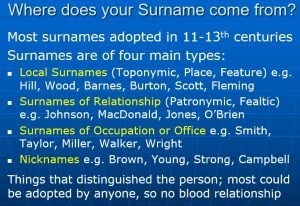
Surnames were adopted based on something that distinguished that person from other people. They fall into one of four main types:
Local Surnames The official name is a toponymic, place name. But they may be to do with all sorts of places or features. And you see common names here, Hill or Wood, Barnes, Burton and nationality, Scott and Fleming.
Surnames of Relationship A son might take the first name of his father. In England, they tend to add ‘son’ on, as in Johnson. In Scotland, ‘mac’ means son, so that goes at the beginning of McDonald. And in Wales, what they tend to do is just make a possessive plural name, such as Jones or Williams. In Ireland, O’Brien means ‘grandson of’.
Surnames of Occupation or Office In most places, there was a smith, a tailor and a wright, and that’s what distinguished the person.
Nicknames All kinds of nicknames were given to people. Brown – they had a dark complexion. Young, Strong, etc. Campbell means ‘twisted mouth. in Scotland.
Most of these could be adopted by anyone. So, it is unlikely that there will be a blood relationship just because the name is the same.
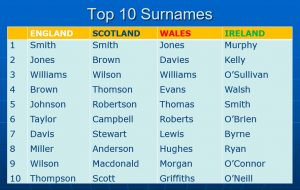
Surnames have evolved over the centuries. This chart shows the top 10 most common surnames in England, Scotland, Wales, and Ireland. Smith is the most common in both England and Scotland – that occupation was very widespread. The nickname Brown is 4th in England, and 2nd in Scotland. In England there’s a spread of types of surname. Scotland is similar but a bit different. Even though ‘Mac’ means ‘son, there are 4 surnames of relationship with son at the end. Macdonald is number 9. There are other clan names such as Robertson, Campbell and Stewart.
In Wales, the top 10 surnames are all Surnames of Relationship. But with the possessive Jones, Davies or Williams as opposed to Johnson, Davidson or Williamson. In Ireland, again, a bit different. 4 of the surnames start with O’
Are You A Member Of A Clan?
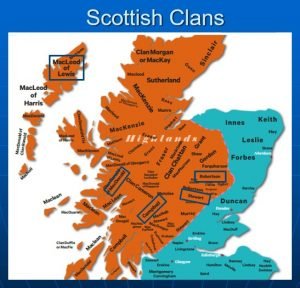
A good example of a surname being tied to a particular area is the clans in Scotland. Here is a clan map and you can see where surnames like MacDonald, Campbell, Stewart and Robertson were from. The mother of former US President Donald Trump was a McLeod from the Isle of Lewis. 25% of the people in Lewis have the MacLeod surname. They were not all blood relations, but they were loyal to that clan.
So, very interesting. Makes you wonder where your family came from. We have made lots of YouTube videos that show how we can help to bring your English, Scottish or other ancestors to life. It’s amazing what we find – that’s what family history is about.
Please feel free to get in touch. Our contact details are on the Research Through People website and at the end of the YouTube video. We do a free consultation, then get back to you with the options that we suggest and associated costs. You can talk to us today. We look forward to helping you and bringing your ancestors and your family to life.
Please fill in your research query and we will be happy to help. We look forward to hearing from you and being part of your ancestral journey.


